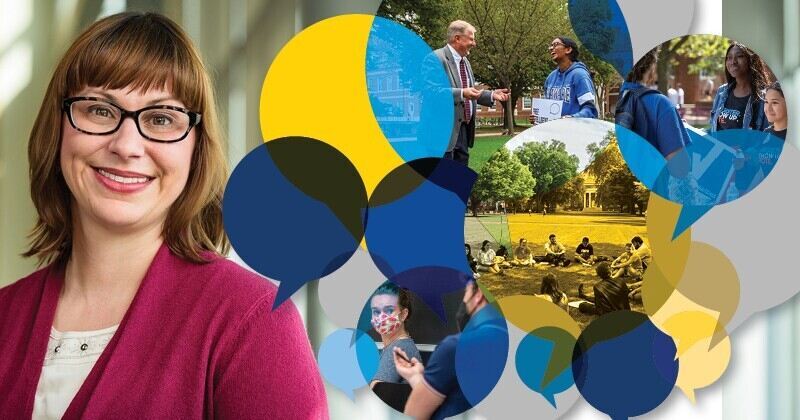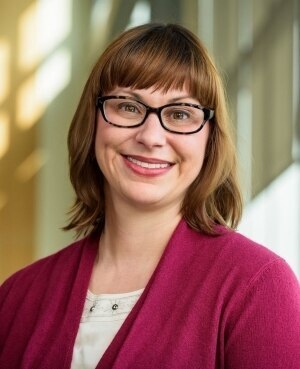Differences of opinion
Initiative promotes students? civil discourse, assesses effective strategies

As a University of Delaware senior with a double major in biochemistry and statistics, Sabrina Barr doesn’t have a lot of classes that allow for the discussion of current events, political controversies and social issues – she’s too busy focusing on science.
So when, as a favor to her roommate, she signed up for a new initiative encouraging such conversations among students, the experience was eye-opening.
“There were so many different perspectives in the [discussion] group I was part of, not just race and gender differences, but different lifestyles, different backgrounds,” Barr said. “We all agreed to be respectful, so it was a really easy way to talk about challenging things but in a setting that’s comfortable.”
That experience is exactly the kind of encounter that the initiative is aiming for as it prepares to hold more such events this semester, according to Lindsay Hoffman, associate professor of communication and associate director of the Center for Political Communication (CPC) at UD. Hoffman, who has been encouraging students to engage in civil discourse through many different courses and programs at the University, sees this new project as a way to provide students with training and opportunities to have open discussions about today’s issues.
In addition, she plans to use her social science expertise not only to give students skills that foster civil discourse but also to objectively assess the effectiveness of those strategies. Her plans are to conduct ongoing research to measure what types of interventions help students become more open to new ideas and different viewpoints.
“Students tell me they don’t know how to talk to people who disagree with them,” Hoffman said. “I”m looking to provide structured conversations in small groups, guided by a trained facilitator, that will equip our students with the tools they can use in other discussions. That’s how real change happens”in small settings, with people talking and listening respectfully.”
To learn more about the UDelEngage project, visit the program’s website.

The small-group discussions, among other initiatives that Hoffman is calling “UDelEngage,” are similar to efforts by the national organization, Living Room Conversations, which works to heal society by connecting people across divides.
The UDelEngage project, which is supported by a grant from the Heterodox Academy, was partially inspired by Hoffman’s leadership of the CPC’s National Agenda series, which brings prominent speakers to campus each fall to discuss varied points of view on a range of topics. National Agenda is also an academic class in which students host and interact with the speakers.
“I wanted to take what I”ve been doing with National Agenda and other civil-discourse initiatives and scale it up for students who aren’t political science or communication majors,” Hoffman said. “These are not conversations that only take place in a classroom. This generation of students wants to be involved, they want to speak up and make a difference. It’s incumbent on us to help them do that at a time in their lives when they”re learning how to be effective and responsible citizens.”
In addition to leading National Agenda, Hoffman has worked with students to offer a less structured opportunity to engage in respectful discussions with others, joining with the national Free Intelligent Conversation project that encourages random passers-by to stop and chat about issues of their choice. She also helped lead students in voter registration and engagement efforts; UD has been recognized nationally in recent years for its success in those efforts.
“Although our campus was once largely apolitical, our initiatives have demonstrated that real change can happen on this campus,” Hoffman wrote in her grant application. “Students can be motivated to become effective citizens while they are in a formative time in their lives.”
Two pilot UDelEngage sessions were held during fall semester, with four more planned this spring, in addition to an upcoming symposium and residence life programming. Participants are provided with resources, suggested topics for discussion and a facilitator to guide the group in ways to express ideas and listen and respond to others. Refreshments will also be on hand.
“I don’t recall a time when anyone got loud with each other or disrespected one another,” said senior Trey Deputy, a member of the Blue Hen Veterans student group who took part in one of the UDelEngage sessions in the fall and described the experience of sharing opinions as enjoyable. ?[Hoffman] always emphasized having a respectful dialogue with each other and also branching out from your comfort zone or social norms.”
Hoffman hopes that kind of student experience will become common.
“I”d like to change the narrative around civil discourse,” she said. “I”d like students to look back and say: UD was a place where I could express my views and I was also exposed to different views.”
Article by Ann Manser, illustration by Christian Derr, photo by Evan Krape
Originally published February 18, 2022
